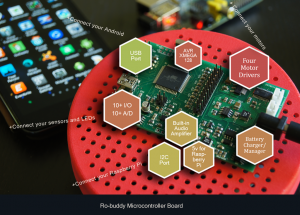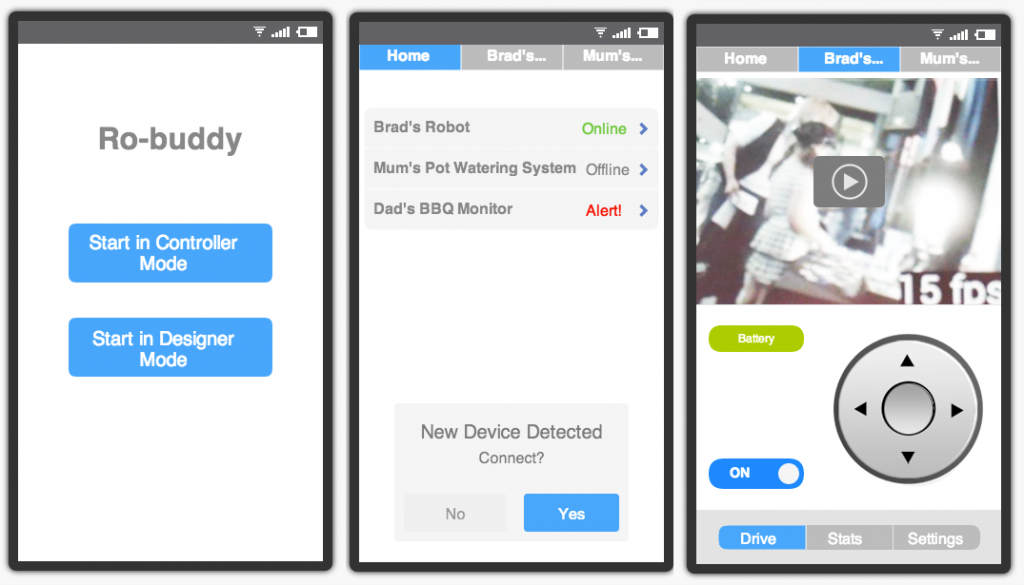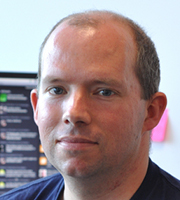The concept of robots has fascinated humans for a long time, even as far back as ancient Greek myths.
has fascinated humans for a long time, even as far back as ancient Greek myths.
But, now, as technology advances rapidly, there are lots of people who think a robotic future is just around the corner.
The founders of Australian startup Robological fall in that camp. And they’re doing their part to usher in that future by creating Ro-buddy, a motherboard/Android app that will allow kids to quickly create their own robots, no coding required (for now).
The team is in the final days of their Indiegogo campaign. Check out our Q&A with the founder Damith Herath below.
What is your startup called?
What’s the story behind your idea?
The foundation of what would become the software framework for Ro-buddy was laid as early as 2010 when the founders worked on an Australian government (Australian Research Council) funded research program called the Thinking Head Project.
However, the Eureka moment came when we volunteered to teach robotics to primary school kids at a few local schools. In brief, the story goes like this – having been academics for sometime and partly forgotten our own childhood, we’ve gravely underestimated the creative and tech prowess of the 10 year olds we were teaching robotics – setting the bar so low, they surprised us by coming up with creative ideas for robots and wanting to create sophisticated robots of their own. Only armed with toy robots at the time, we quickly realized that these kids need something more sophisticated as a starting point, but at the same time not too complicated to dishearten them. Working on this challenge over the last year or so we realized that combining the software framework we’ve already developed (which was used by artists for creating interactive art/robot projects) in an Android App with a tightly integrated hardware platform would achieve this end goal.
The combination of an App and the hardware enables anyone to build custom control interfaces using a drag-n-drop interface on an Android device without writing a single line of code. In addition our hardware could directly interface with the Raspberry Pi enabling users to make use of additional computing power and wireless connectivity provided by the Pi.
We’ve seen a lot of parents purchasing Raspberry Pis for their kids in the hope they’d get hooked on to programming and hacking. But most get discouraged by the steep learning curve at the beginning. Ro-buddy bridges this gap by enabling easy connectivity and providing an out of the box experiences for these kids so they’re not discouraged at the beginning of the computing journey.
In a nutshell, Ro-buddy helps you to concentrate on your creative idea rather than the hardware/software needed to realize it.
Who are the founders, and what are their backgrounds?
Damith Herath – A roboticist with a PhD in Robotics
Christian Kroos – A cognitive scientist with a PhD in Linguistics
Zhengzhi Zhang – A software engineer with an MSc in Engineering.
Where are you based?
We’re based in Sydney, Australia
What’s the startup scene like where you are based?
There’s a fairly vibrant startup community in Sydney and it is quite active and growing at the moment. However, investors are still hedging their bets mainly on traditional industries such as mining. In particular, there’s very little enthusiasmfor high tech startups that involve hardware like ours.
How do you see people using Ro-buddy once it’s developed?
As mentioned earlier, Ro-buddy is a great way to build robots and other things with minimal programming effort – for example someone who bought a Raspberry Pi and then never really managed to use it to build something because of the initial learning curve – Ro-buddy provides a great entry point.
It is a great way to combine your Android device and hardware to create robots, toys, school projects etc. Having a tightly integrated hardware/software system enables people to concentrate on their creative side rather than the software/hardware aspects, which are usually the realms of geeks.
Another great way to use Ro-buddy is to give a new lease of life for your old RC toys. You could easily replace your old RC toy car’s electronics with a Ro-buddy board and start controlling it with an Android device! In combination with a Raspberry Pi you could even turn it into a spy bot or a semi-autonomous vehicle using the Python API that comes with Ro-buddy.
Where do you see the field of robotics going in the next 10 years?
We’re heading for a very interesting decade of robotics.
We personally believe that this period is similar in nature to the beginnings of the PC revolution. We’ve seen new companies like Re-think bringing robotic manufacturing to a new level and many other successful startups appearing on the map. There’s also crowd funded robotic projects like Romo. Mind you we were engaged in a similar project slightly before Romo that used the software framework mentioned earlier – A project in collaboration with a renowned artist – Stlearc
Increasingly we’ll see human friendly robots entering the day-to-day use in unconstrained public environments. They’ll be in different shapes, sizes and form but would be fairly ubiquitous. Also, the Internet of Things will play a major role in this period.
What are some of the milestones your startup has already reached?
Ro-buddy is only the beginning for us. We are committed bringing the knowledge gained from working on the Thinking Head project and turning it into useful and commerciallyviable robotic products. So far, we have been able to assemble a great team to develop critical software and hardware. We’ve also been able garner the help of a few key industry/academic leaders in Australia to act as our mentors.
For example, Prof Chris Drane who is a serial entrepreneur on his own right is one of our mentors.
What are your next milestones?
First priority is to complete the Ro-buddy project and deliver on our promises to our backers. In tandem we’re working on another robotic project – which is in stealth mood at the moment.
Also, we’re exploring the possibility of using Ro-buddy on industrial strength applications.
Once we have these working prototypes, we’ll be looking at potential partnerships, funding and/or investment opportunities.
Where can people find out more? Any social media links you want to share?
Web: http://ro-buddy.com
Twitter: @RobologicalCo (https://twitter.com/robologicalco)
Facebook: https://www.facebook.com/Robological











